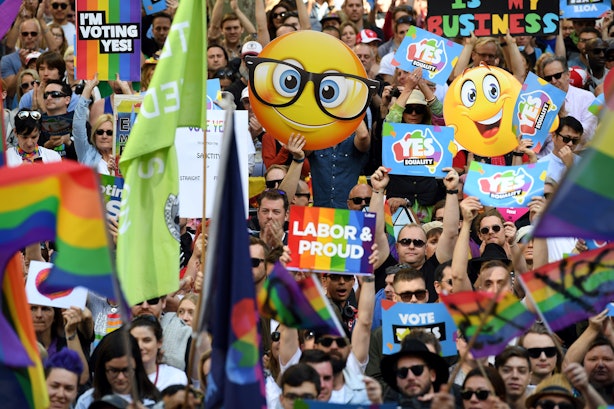If People Were to Step Down When Bullying Occurs it Would Completely Eliminate It
Why don't People Step down when they see bullying?
One of the best ways to stop bullying in its tracks — apart from, of course, not doing it, and teaching your children not to do it either — is for a bystander to step in when it is safe to do so and diffuse the situation. The practice, called bystander intervention, can be as simple as engaging the person being bullied in such a way that it cuts off the person doing the bullying, or firmly telling the aggressor to stop. Not everyone, however, is willing to intervene on behalf of others, and new research is trying to figure out why. A study from scientists at the State University of New York found that heterosexual people don't step in when they see anti-gay bullying if they don't believe that LGBTQ people face discrimination in general.
That (erroneous) belief — that LGBTQ people don't face discrimination — is called "amnestic heterosexism," and it's a concept that was developed by the theorist N. Eugene Walls, an associate professor at the University of Denver specializing in modern prejudice theory. According to Walls, there are four other categories that make up homophobia as a whole, and they run the gamut from stereotyping gay and lesbian people (positive stereotype heterosexism) to violent anti-gay sentiment (hostile heterosexism). All of these aspects of homophobia privilege being straight over being gay, and invalidate queer identity and relationships, whether overtly or not.
Amnestic heterosexism in particular, comes from the word amnesia, or clinical memory loss. These are people who don't believe that homophobia still exists, that queer people face discrimination or inequality, and that documented examples of discrimination are just misunderstandings, or only happen to a small minority. The SUNY scientists were interested in whether belief in anti-gay discrimination influenced anti-gay bullying, so they took 238 undergraduates, all of whom were straight, and asked them questions to determine how many aspects of amnestic heterosexism they believed in. They then posed a hypothetical bullying situation in which someone was called an anti-gay slur.
"As expected," the scientists wrote, "those with greater AH [amnestic heterosexist] beliefs perceived the situation as less severe/dangerous, felt less personally responsible to intervene, and were more blaming toward the target of bullying. In multivariate analyses, AH was indirectly associated with intent to confront the perpetrator via a path of reduced personal responsibility." In other words, if they didn't believe that inequality in the LGBTQ community was a problem, they found ways to excuse themselves from intervening, saw it as much less serious than other kinds of bullying, or even blamed the person being bullied
This has big implications, because bullying and mistreatment against LGBTQ folks remain problems with severe consequences, whether or not the amnestic heterosexists think so. Studies by the Human Rights Campaign have found that LGBTQ youth in America are twice as likely as straight youth to be called names or be physically harassed at school. It's a pervasive issue: a 2007 study by the Gay, Lesbian & Straight Education network found that 87 percent of non-heterosexual respondents had experienced bullying at school. And that's just in school; the harassment and bullying experiences of LGBTQ people can stretch to any part of life, from walking down the street to interactions with coworkers, acquaintances or family. One in six lesbian, bisexual or gay people has experienced a biphobic or homophobic hate crime in the last three years and a quarter hide their status in public to avoid harassment, according to the LGBTQ advocacy group Stonewall.
The way to deal with people who don't believe anti-gay discrimination is a thing? Facts. While they may believe in a world that we all would love to see come true, it's out of touch with what actually happens — and that makes them less effective allies when they see anti-LGBTQ injustice, because their prejudices make them less capable of seeing it. The rose-colored glasses need to come off.

Comments